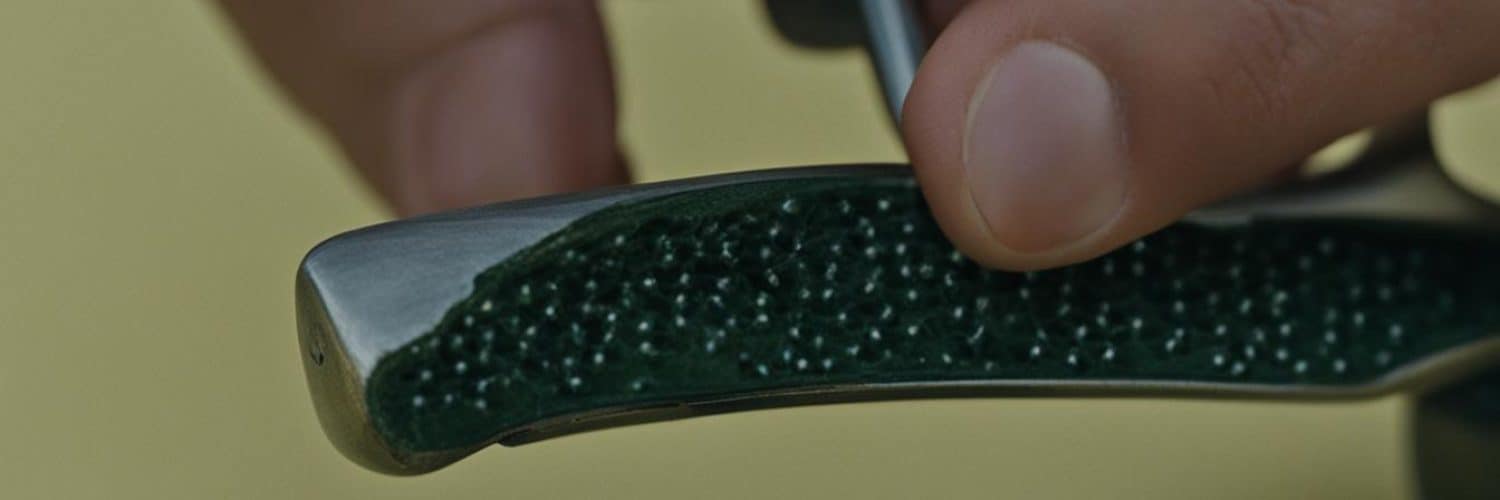Regripping your golf clubs is an essential maintenance task that can have a significant impact on your game. By learning how to regrip your own clubs, you can save money and ensure that your grips are in top condition. In this step-by-step guide, we will walk you through the process of regripping your golf clubs at home, from selecting the right grips to properly installing them. With our expert advice, you’ll have all the information you need to improve your game and keep your clubs performing their best.
Key Takeaways:
- Regripping your golf clubs is important for maintaining optimal performance on the course.
- Worn-out or damaged grips can negatively impact your swing and control of the club.
- Choosing the right golf grips involves considering factors such as size, texture, firmness, and weather conditions.
- Before regripping, gather the necessary supplies, including new grips, grip tape, a utility knife, grip solvent, and vise clamps.
- Follow our step-by-step guide to properly regrip your golf clubs at home.
The Importance of Regripping Your Golf Clubs
Neglecting to regrip your golf clubs can have a negative impact on your game. Worn-out or damaged grips can affect your swing and overall control of the club. Studies have shown that using the wrong grip size can result in a decrease in scoring average by 2-5 strokes per round. By regripping your clubs, you can ensure a proper fit, improved performance, and enhanced comfort.
When grips lose their original tackiness or become hard and worn, they can slip in your hands, leading to inconsistent shots and reduced accuracy. Additionally, worn grips can affect the alignment of your hands, causing your shots to veer off-target. By regripping your golf clubs, you can restore the original feel and control, allowing for more confident and consistent shots.
Having the right grip size is crucial for optimal performance. If the grip is too small, you may find it difficult to maintain control and generate power, resulting in weak shots. On the other hand, grips that are too large can hinder your ability to release the club properly, impacting your swing speed and accuracy.
Choosing the right grip size can make a significant difference in your game. It’s recommended to consult with a professional or use a grip sizing chart to determine the correct size for your hands and playing style.
By regripping your clubs, you have the opportunity to customize the grips to suit your preferences and playing conditions. Golf grips come in a variety of materials, textures, and firmness levels. For example, corded grips are ideal for wet or humid conditions, providing enhanced traction and preventing slippage. Alternatively, smooth synthetic grips offer a soft and comfortable feel, perfect for players seeking maximum comfort and control.
Benefits of Regripping Your Golf Clubs:
- Improved grip traction and control
- Enhanced shot consistency and accuracy
- Increased confidence and comfort
- Ability to customize grip materials and textures
- Prevention of slippage during swing
Regripping your golf clubs is a simple process that can have a significant impact on your game. In the following sections, we will guide you through choosing the right grips, gathering the necessary supplies, and providing a step-by-step tutorial for regripping your clubs with ease.
Choosing the Right Golf Grips
When it comes to regripping your golf clubs, choosing the right grips is crucial for optimal performance on the course. There are several factors to consider when selecting new golf grips that will enhance your game. Let’s explore these factors in detail.
Grip Size
One of the most important considerations when choosing golf grips is the size. Using grips that are too big or too small can greatly affect your swing and overall control of the club. It’s essential to find the right grip size that fits comfortably in your hands and allows for proper finger placement. Consider getting fitted or try out different grip sizes to determine the one that feels best for you.
Grip Texture and Firmness
The grip texture and firmness also play a significant role in your overall performance. Some golfers prefer a smoother grip texture, while others may prefer a more textured feel for increased traction. Additionally, the firmness of the grip can impact the feedback you receive on your swing. Experiment with different textures and firmness levels to find the grip that suits your preferences and playing style.
Weather Conditions
The weather conditions in which you typically play should also be taken into account when selecting grips. If you frequently play in wet or humid environments, corded grips can provide better traction and prevent slipping. On the other hand, if you often play in dry conditions, a smoother grip may be more suitable. Consider the climate and conditions of your usual golfing environment to choose grips that offer optimal performance.
Hybrid Grips
Hybrid grips, also known as combo grips, are another option to consider. These grips offer a combination of control and comfort by combining different materials, such as rubber and cord or rubber and leather. Hybrid grips may be suitable if you’re looking for a balance between feel and durability. Experiment with different grip options to find the one that enhances your game.
Taking the time to carefully choose the right golf grips can make a significant difference in your overall performance on the course. Consider grip size, texture, firmness, and weather conditions to find the grips that best suit your needs and preferences. With the right grips, you’ll have the confidence and control to improve your golf game.
Supplies Needed for Regripping Golf Clubs
Before you can start the regripping process, it’s important to gather all the necessary supplies. Make sure you have the following items on hand:
New Golf Grips
Choose golf grips that match your preferences and size. Consider factors like grip texture, firmness, and weather conditions.
Grip Tape
Grip tape is essential for securing the grip to the club shaft. It provides a strong bond and prevents slippage during use.
Utility Knife or Hook Blade
A utility knife or hook blade is needed to remove the old grips. Ensure you have a sharp and reliable tool for this task.
Grip Solvent
Grip solvent makes the regripping process easier by lubricating the grip and allowing for smooth installation. It also helps activate the adhesive on grip tape.
Rubber Vise Clamps
Rubber vise clamps are used to secure the club during the regripping process. They provide stability and prevent damage to the club while you work on it.
Having these supplies readily available will ensure a seamless and successful regripping experience. Now that you have everything you need, let’s move on to the step-by-step guide to regripping your golf clubs.
Step-by-Step Guide to Regripping Your Golf Clubs
Now that you have all the necessary supplies, it’s time to start regripping your golf clubs. Follow these step-by-step instructions:
- Set up your workspace and ensure you have enough room to work comfortably.
- Remove the old grips using a utility knife or hook blade, being careful not to damage the shaft.
- Scrape away the old grip tape to expose the bare shaft.
- Apply new grip tape evenly to the shaft, leaving enough space for the grip to fit.
- Apply grip solvent to the inside of the new grip and pour the excess over the tape on the shaft.
- Slide the new grip onto the shaft, making sure it is aligned correctly.
- Allow the grip to set for a few hours before using the club.
Follow these steps carefully to ensure a successful regripping process. Taking your time and paying attention to detail will result in well-installed grips for improved performance on the course.
Regripping Golf Clubs Without a Vise
If you don’t have a vise, don’t worry. It’s still possible to regrip your golf clubs without one. Instead, you can secure the club by wedging it between your feet or using other stable surfaces. The process remains the same, with the only difference being the method of securing the club. Just make sure to apply enough grip pressure to ensure a secure fit.
Regripping your golf clubs is easy and can be done without a vise. Follow these steps:
- Step 1: Set up your workspace and choose a stable surface to secure the club. You can wedge the club between your feet or use other stable objects to hold it in place.
- Step 2: Follow the same process as described in the previous section for removing the old grip and preparing the shaft.
- Step 3: Apply grip tape evenly to the shaft, leaving enough space for the new grip to fit.
- Step 4: Apply grip solvent to the inside of the new grip and pour the excess over the tape on the shaft.
- Step 5: Slide the new grip onto the shaft, making sure it is aligned correctly.
- Step 6: Apply firm grip pressure to ensure the grip is securely in place.
- Step 7: Allow the grip to set for a few hours before using the club.
By following these steps, you can successfully regrip your golf clubs without a vise. Remember to apply enough grip pressure to ensure the grip is securely in place. Now you’re ready to improve your game with fresh grips!
Tips for Maintaining and Cleaning Golf Grips
Once you’ve regripped your golf clubs, it’s important to maintain and clean the grips regularly. This will help prolong their lifespan and ensure optimal performance.
To clean your grips, simply use warm water and mild soap, scrubbing gently with a brush. Avoid using harsh chemicals or abrasive materials that could damage the grips. Regularly inspect your grips for signs of wear or damage and replace them as needed.
Keeping your golf grips clean and well-maintained is essential for a consistent and comfortable grip. By following these simple tips, you can ensure that your regripped clubs remain in top condition, allowing you to perform your best on the course.
Avoid Harsh Chemicals and Abrasive Materials
When cleaning your golf grips, it’s crucial to avoid harsh chemicals or abrasive materials that could cause damage. Stick to mild soap and warm water, which will effectively remove dirt and grime without compromising the integrity of the grips.
Regularly Inspect for Wear or Damage
Take the time to regularly inspect your grips for any signs of wear or damage. Look for cracks, tears, or excessive wear on the grip surface. If you notice any issues, it’s recommended to replace the grip to maintain optimal performance.
Replace Grips as Needed
Golf grips naturally wear out over time, so it’s important to replace them when necessary. If you notice a significant decrease in grip traction or comfort, it may be time to regrip your clubs. Aim to regrip your clubs every 1-2 years, depending on how frequently you play and the overall condition of your grips.
| Benefits of Maintaining and Cleaning Golf Grips |
|---|
| 1. Extended lifespan of grips |
| 2. Enhanced grip traction and control |
| 3. Improved overall performance on the course |
| 4. Increased comfort during swings |
| 5. Cost-effective alternative to frequent regripping |
Golf Grip FAQs
Here are some frequently asked questions about regripping golf clubs:
Q: How often should I regrip my golf clubs?
A: It is recommended to regrip your clubs every 1-2 years or whenever you notice significant wear or damage.
Regripping your golf clubs is an essential part of maintaining optimal performance on the course. By following the step-by-step guide and selecting the right grips for your needs, you can ensure improved control, comfort, and overall playability. Whether you choose to regrip your clubs yourself or seek professional assistance, it’s important to prioritize the health of your grips to enhance your golfing experience.
Now that you have all the information you need, you can confidently embark on the journey of regripping your golf clubs. Remember to regularly maintain and clean your grips, paying attention to signs of wear or damage. With proper care and attention, your regripped clubs will help you achieve your best game on the fairway.
In the next section, we will provide a concise conclusion to summarize the key points and benefits of regripping your golf clubs at home.
Conclusion
Regripping your golf clubs at home is an excellent way to improve your game while saving money. By following our step-by-step guide on how to regrip golf clubs, you can ensure that your clubs are always in top condition. Selecting the right grips for your needs is crucial, as it can greatly impact your swing and control.
Regularly maintaining and cleaning your grips is essential for prolonging their lifespan and maintaining optimal performance. Remember to clean them with warm water and mild soap, avoiding harsh chemicals that could damage the grips. Additionally, inspect your grips regularly for signs of wear or damage, and replace them as needed.
With the knowledge and skills to regrip your own clubs, you’ll be ready to take on any golfing challenge that comes your way. Don’t hesitate to try regripping your clubs at home – it’s a cost-effective and rewarding investment in your game.
FAQ
How often should I regrip my golf clubs?
It is recommended to regrip your clubs every 1-2 years or whenever you notice significant wear or damage.
Can I regrip my golf clubs at home?
Yes, you can regrip your golf clubs at home with the right tools and supplies. It’s a cost-effective way to maintain optimal performance.
What supplies do I need to regrip my golf clubs?
To regrip your golf clubs, you’ll need new grips, grip tape, a utility knife or hook blade, grip solvent, and rubber vise clamps (optional). These supplies will help ensure a successful regripping process.
How do I remove the old grips?
You can use a utility knife or hook blade to carefully remove the old grips without damaging the shaft. Take your time and be gentle during this step.
Can I regrip my golf clubs without a vise?
Yes, you can still regrip your golf clubs without a vise. You can secure the club by wedging it between your feet or using other stable surfaces. Just make sure to apply enough grip pressure for a secure fit.
How do I clean and maintain my golf grips?
You can clean your golf grips with warm water and mild soap, using a brush to gently scrub them. Avoid using harsh chemicals or abrasive materials that could damage the grips. Regularly inspect your grips for wear or damage and replace them as needed.
How much does it cost to regrip golf clubs?
The cost of regripping your golf clubs can vary depending on the type of grips you choose. On average, it can cost between
FAQ
How often should I regrip my golf clubs?
It is recommended to regrip your clubs every 1-2 years or whenever you notice significant wear or damage.
Can I regrip my golf clubs at home?
Yes, you can regrip your golf clubs at home with the right tools and supplies. It’s a cost-effective way to maintain optimal performance.
What supplies do I need to regrip my golf clubs?
To regrip your golf clubs, you’ll need new grips, grip tape, a utility knife or hook blade, grip solvent, and rubber vise clamps (optional). These supplies will help ensure a successful regripping process.
How do I remove the old grips?
You can use a utility knife or hook blade to carefully remove the old grips without damaging the shaft. Take your time and be gentle during this step.
Can I regrip my golf clubs without a vise?
Yes, you can still regrip your golf clubs without a vise. You can secure the club by wedging it between your feet or using other stable surfaces. Just make sure to apply enough grip pressure for a secure fit.
How do I clean and maintain my golf grips?
You can clean your golf grips with warm water and mild soap, using a brush to gently scrub them. Avoid using harsh chemicals or abrasive materials that could damage the grips. Regularly inspect your grips for wear or damage and replace them as needed.
How much does it cost to regrip golf clubs?
The cost of regripping your golf clubs can vary depending on the type of grips you choose. On average, it can cost between $1 to $20 per grip, excluding the cost of any additional supplies.
Can I regrip my golf clubs myself?
What factors should I consider when choosing golf grips?
When choosing golf grips, factors to consider include grip size, texture, firmness, and weather conditions. Select grips that suit your preferences, playing style, and the conditions you typically play in to optimize your performance on the course.
to per grip, excluding the cost of any additional supplies.
Can I regrip my golf clubs myself?
What factors should I consider when choosing golf grips?
When choosing golf grips, factors to consider include grip size, texture, firmness, and weather conditions. Select grips that suit your preferences, playing style, and the conditions you typically play in to optimize your performance on the course.







Add comment